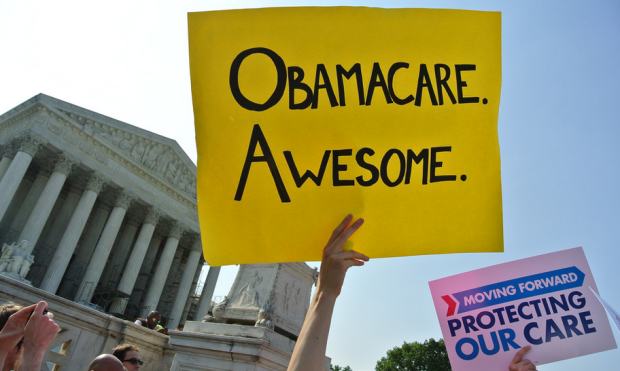Alan: By 2017, three times as many Americans will approve Obamacare as a marked improvement over the exclusionary free market marketeering that went before it. Even now, 47% want to keep or improve Obamacare whereas 37% want to repeal or replace. http://talkingpointsmemo.com/livewire/poll-more-americans-want-to-keep-or-expand-obamacare-than-repeal-it (I cannot find any statistics for the number of Americans who wish to repeal Social Security but am reasonably certain that the number is 15% or more. Or at least that's the number of ruggedly individualistic ideologues who have persuaded themselves it would be a good idea. When considering American politics -- particularly its right-wing manifestations -- it is helpful to remember that about a quarter of the population is manifestly lunatic.)
By JONATHAN WEISMAN
Published: December 26, 2013 308 Comments
WASHINGTON — With the first enrollment deadline now passed, Republicans who have made the repeal of President Obama’s health care law their central aim are confronting a new reality: More than two million Americans are expected to be getting their health insurance through the Affordable Care Act come Jan. 1.
Gabriella Demczuk/The New York Times
Senator Ron Johnson, Republican of Wisconsin, says that the number of people covered by the Affordable Care Act means the law cannot just be repealed and forgotten.
Chip Somodevilla/Getty Images
Senator Lindsey Graham, Republican of South Carolina.
Readers’ Comments
Share your thoughts.
The enrollment figures may be well short of what the Obama administration had hoped for. But the fact that a significant number of Americans are now benefiting from the program is resulting in a subtle shift among Republicans.
“It’s no longer just a piece of paper that you can repeal and it goes away,” said Senator Ron Johnson, Republican of Wisconsin and a Tea Party favorite. “There’s something there. We have to recognize that reality. We have to deal with the people that are currently covered under Obamacare.”
And that underscores a central fact of American politics since Franklin D. Roosevelt signed the Social Security Act during the Depression: Once a benefit has been bestowed, it is nearly impossible to take it away.
Republicans are considering several ideas for how to proceed. Mr. Johnson argued that Congress should do away with the mandate that most people obtain insurance, but not the online exchanges at the heart of the law. Instead, he said, the options in the marketplaces should be augmented by other choices that fall short of the law’s coverage standards, such as catastrophic health plans. (Many policy analysts and insurance companies say such a move would not work, because the mandates are essential to delivering a diverse pool of uninsured people.)
Senator Lindsey Graham, Republican of South Carolina, said that health care strategy was the hottest topic of debate in closed-door political sessions.
“The hardest problem for us is what to do next,” Mr. Graham said. “Should we just get out of the way and point out horror stories? Should we come up with a mini Contract With America on health care, or just say generally if you give us the Congress, the House and the Senate in 2014, here’s what we will do for you on multiple issues including health care? You become a more effective critic when you say, ‘Here’s what I’m for,’ and we’re not there yet. So there’s our struggle.”
Senator Kelly Ayotte, Republican of New Hampshire, said she was teaming up with Democrats on a host of incremental changes to the law, such as expanding health savings accounts and repealing a tax on medical devices. And other Republicans are wondering aloud how long they can keep up the single-minded tactic of highlighting what is wrong with the law without saying what they would do about the problems it was supposed to address.
Representative Tom Price, Republican of Georgia, a physician and a prominent conservative voice on health care, is pushing what he calls the Empowering Patients First Act, which would repeal the health care law but keep its prohibition on exclusions for pre-existing conditions in private health insurance.
The bill would allow for insurance to be sold across state lines, push small businesses to pool together to buy insurance for their employees, expand tax-free health savings accounts, cap malpractice lawsuits, and offer tax credits of $2,163 for individuals and $5,799 for families to buy health plans.
The American Action Forum, a conservative advocacy group run by Douglas Holtz Eakin, a former director of the Congressional Budget Office, analyzed the Price plan this month. The group concluded that it would lower insurance premiums by as much as 19 percent by 2023, while leaving the ranks of the uninsured about five percentage points higher than the Affordable Care Act would by then.
Representative Paul D. Ryan of Wisconsin, the Republican vice-presidential nominee in 2012 and a possible 2016 presidential hopeful, is preparing his own health insurance plan for release early next year.
Mr. Ryan’s plan will build on one that he and Senator Tom Coburn, Republican of Oklahoma, introduced in 2009, according to aides familiar with it. The proposal, called the Patients’ Choice Act, would have eliminated the tax break for employer-provided health care to finance a tax credit of about $5,700 for families and $2,300 for individuals. States would have been asked to create insurance marketplaces like the ones many have created under the Affordable Care Act.
As with the Obama health care law, the Ryan proposal demanded that insurers meet minimum standards of coverage and be prevented from excluding the sick. But instead of mandating penalties for failing to buy insurance, the approach would have automatically enrolled people unless they opted out.
- 1
- 2



No comments:
Post a Comment